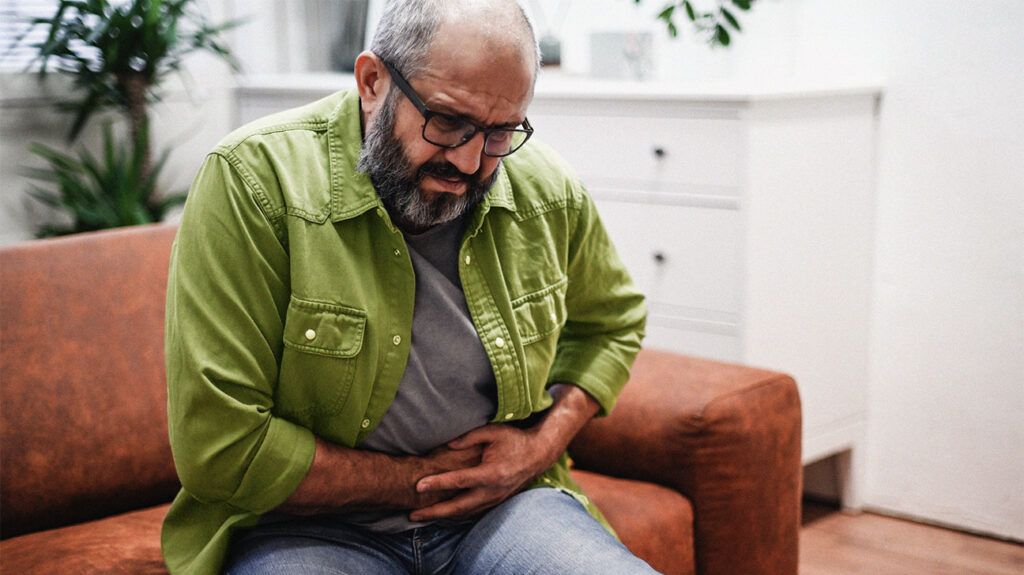Gallstones are hard pieces of material that develop in the gallbladder. Irritable bowel syndrome (IBS) is the term for a group of digestive symptoms that occur together, including abdominal pain and changes in bowel movements.
Gallstones and IBS are both common conditions that are related to the gallbladder. The gallbladder may play a role in the development of IBS symptoms.
However, they are separate conditions that have different symptoms and treatments.
This article examines the link between gallstones and IBS. It also discusses the symptoms and treatment of both conditions.

Gallstones affect
Gallstones usually consist of cholesterol or bilirubin. Bilirubin forms when the body breaks down hemoglobin. It can be found in blood and bile and typically passes out of the body through stool.
Gallstones form in the gallbladder and can range in size from a grain of sand to a golf ball.
In some cases, a person may have gallstones and experience
If a gallstone blocks a duct for a period of time, it may cause inflammation of the gallbladder wall. Medical professionals refer to this as cholecystitis.
Possible symptoms of gallstones include:
- right upper abdominal pain, particularly after eating greasy or spicy foods
- jaundice
- nausea and vomiting
IBS affects
IBS is the medical term for a specific group of symptoms that occur at the same time.
The common symptoms of IBS are abdominal pain and changes in bowel movements.
Common changes in bowel movements due to IBS include diarrhea, constipation, or both.
Other common symptoms of IBS include:
- bloating
- the feeling that the bowels are not empty after bowel movements
- whitish mucus in the stool
The gallbladder
The gut microbiota is
BAs and microbiota interact in the GI tract as part of the digestive process. Their relationship
People with IBS display different levels of certain BAs. Studies show that people with IBS may have significantly higher levels of fecal primary BA and a decrease in secondary BA.
Studies also link increased primary BA with IBS symptoms.
A 2022 study also suggests that gallstones may be associated with IBS. The study included 401 people who experienced abdominal pain and gallstones. Of the participants,
Medical professionals
This procedure has a direct effect on how the body makes BAs. This may increase a person’s risk of developing IBS.
One 2023 study investigated the association between cholecystectomy and IBS risk. The study included 413,472 participants. It concluded that people who had a history of cholecystectomy had a
Treatment options are one of the ways gallstones and IBS differ.
Gallstones
If a person has gallstones but no symptoms, they
If gallstones do cause pain, a healthcare professional may recommend cholecystectomy surgery to remove the gallbladder.
The two main types of cholecystectomy are:
- Laparoscopic cholecystectomy: This is a keyhole procedure where a surgeon uses surgical instruments that they insert through very small incisions in the abdomen. It is a minimally invasive procedure, and a person will often be able to go home on the same day as the surgery.
- Open cholecystectomy: This
is a form of open surgery where a surgeon removes the gallbladder from a larger incision in the abdomen. A surgeon will often only opt for an open cholecystectomy if:- a person has a severely inflamed gallbladder
- a person has scarring from other operations
- problems occur during a laparoscopic cholecystectomy
Laparoscopic cholecystectomy is the most common form of cholecystectomy.
People can often return to their usual physical activity around a week after a laparoscopic cholecystectomy.
If a person has a serious medical condition that prevents surgery, a healthcare professional may suggest a series of nonsurgical treatments for gallstones.
These treatments aim to remove or break up the stones. Nonsurgical treatments for gallstones include:
- Endoscopic retrograde cholangiopancreatography (ERCP): ERCP uses upper GI endoscopy and X-rays
to locate and treat issues with the bile and pancreatic ducts. This procedure can help remove a gallstone that is blocking the bile duct. - Oral dissolution therapy: This treatment uses medications that contain BAs to break up gallstones. These medications often only break up small cholesterol stones.
- Shock wave lithotripsy: During shock way lithotripsy, a doctor uses shock waves to break a gallstone into small pieces.
Read about natural remedies for gallstones.
IBS
A healthcare professional
Common changes an individual may wish to make to improve their IBS symptoms include:
- eating more fiber
- avoiding gluten
- following a special eating plan called a low FODMAP diet
A person may also use medications to treat certain symptoms of IBS.
The following medications can help treat diarrhea:
- loperamide
- an antibiotic called rifaximin (Xifaxan)
- eluxadoline (Viberzi)
Constipation medications include:
- fiber supplements
- laxatives
- lubiprostone (Amitiza)
- linaclotide (Linzess)
- plecanatide (Trulance)
The following medications can help treat abdominal pain:
- antispasmodics
- antidepressants
- coated peppermint oil capsules
People may also take probiotics to help treat their IBS symptoms. Probiotics are live microorganisms similar to those in the digestive tract.
A person can also undergo certain mental health therapies to help improve their IBS symptoms. These include:
- Cognitive Behavioral Therapy (CBT): CBT is a therapeutic approach that
aims to help modify how an individual thinks and behaves. It can help improve IBS symptoms. - Gut-directed hypnotherapy: During this type of therapy, a therapist will use hypnosis to help improve a person’s IBS symptoms.
- Relaxation training: This can help people relax their muscles and reduce stress. This can help them reduce their symptoms of IBS.
Gallstones are hard pieces of cholesterol or bilirubin that build up in the gallbladder. They can cause abdominal pain, jaundice, nausea, and vomiting.
Medical professionals can treat gallstones with a cholecystectomy. This is the surgical removal of the gallbladder.
Gallstones and cholecystectomy may both increase a person’s risk of developing IBS.
IBS is a medical condition that causes abdominal pain and changes in bowel movements. Diarrhea and constipation are the two common changes in bowel movements related to IBS.
